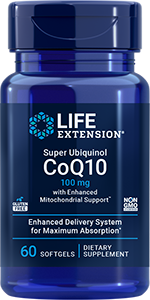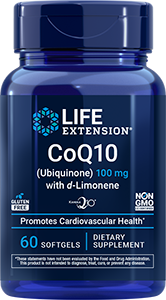
Ubiquinone vs. Ubiquinol: Which Form Is Better for You?
Published: April 2025
If you've been looking to take a coenzyme Q10 (or CoQ10) supplement, you may have seen the terms "ubiquinone" and "ubiquinol" tossed around. What do these complicated-sounding terms mean, and aside from the spelling, is there a difference?
The first part of this question is easy to answer: ubiquinone is another name for CoQ10, and ubiquinol is just a different version of ubiquinone. Your body produces both of them in your cells, but because our levels tend to dip as we age, CoQ10 supplements are a mainstay of many heart health and healthy aging regimens.
Here's where things get tricky: you may see supplements that list ubiquinone or ubiquinol, or even both, in their ingredient lists. So which one should you take?
Keep reading to learn what to look for when choosing the right CoQ10 supplement for you.
Why is CoQ10 good for you?
Let's start with the important role of CoQ10 in a healthy human body. CoQ10 is a coenzyme, meaning it helps increase key enzymes' actions in the body. Enzymes help speed up the essential bodily functions that keep you healthy, like digesting your food.
Coenzyme Q10 is an essential antioxidant in cell membranes inside your body. It is also a key ingredient in the process that your cells use to make energy inside the energy factories of your cells, which are called mitochondria. About half of the CoQ10 in your body is found within the mitochondria, and CoQ10 plays a key role in mitochondrial support.
As mentioned, one of CoQ10's important roles in the body is as an antioxidant. Antioxidants are special substances that act like superheroes, combating and neutralizing free radicals. In nature, free radicals are molecules that impact normal, healthy reactions inside cells. Some examples are free radicals caused by ultraviolet light and pollution.
Studies show that CoQ10's unique status as both a coenzyme and an antioxidant has beneficial effects:
- Essential for cellular energy production
- An antioxidant made by your own body
- Helps fight the effects of general fatigue
- Supports heart health
- Supports liver health and function
- Inhibits inflammatory factors to support whole-body health
- Supports healthy aging
So CoQ10 sure has some vital roles in keeping you healthy. Does that mean it's a vita-min (which, after all, are nutrients that are vital for your survival)? Nope! While coenzyme Q10 functions like a vitamin in your body, it is not technically a vitamin.
CoQ10 production naturally decreases as we age, so older people tend to have lower levels of CoQ10. Certain health conditions and medications can also affect CoQ10 levels. For these folks, a supplement can help pick up where nature left off!
Which form of CoQ10 is best?
The short answer is that some research suggests ubiquinol is more bioavailable (usable to the body), which makes it a better bet.
The long, scientific answer to this question is that both forms of CoQ10 (ubiquinol and ubiquinone) benefit your body, but there is a chemical difference in their structure at the molecular level that may impact how well your body uses CoQ10.
Namely, ubiquinone is oxidized, and ubiquinol is reduced (it is not oxidized). The chemical structure of ubiquinol may make it easier for your body's cells and tissues to use it. The ubiquinone version is not as readily absorbed.
That being said, your body may still be able to benefit from both forms. Studies show your body continuously converts ubiquinone to ubiquinol and back. Your blood transports CoQ10 in the ubiquinol form, which may be one reason it appears to be more bioavailable.
In summary: if you can, choose ubiquinol for its potential to be better absorbed by your body. If you do choose ubiquinone, though, you're likely still getting benefits.
Why might ubiquinol be more absorbable than ubiquinone?
Your body's absorption of CoQ10 is a complicated process. Clinical studies report individual differences in CoQ10 absorption, meaning that two people taking the same CoQ10 supplement and dosage might absorb different amounts.
Arguments in favor of ubiquinol come down to the concept of bioavailability, a term researchers use to describe how much and how fast the original CoQ10 contained in a supplement enters your circulation (measured by testing plasma levels). Ideally, you want to take a supplement with a higher bioavailability, so you get the biggest bang for your buck, so to speak.
Pro tip: ubiquinone CoQ10 is fat-soluble, so it is better absorbed with a meal that contains oil or fat. Supplements that use oil-based capsules, such as softgels with sunflower oil, also help make the CoQ10 more bioavailable (more easily absorbed by your body).
So if you do choose this type of supplement, combining it with fat can help ensure you absorb its benefits.
Explore Our Best CoQ10 Supplements
What Happens After You Take a CoQ10 Supplement?
After you take a coenzyme Q10 supplement in either ubiquinol or ubiquinone form, the CoQ10 passes through your stomach, where digestion starts.
It is then transported to your small intestine, where it is broken down and transported into your lymph, the watery fluid that flows through your lymphatic system and ultimately into your bloodstream and cells.
How long it will take for your body to benefit from this supplement depends on multiple factors.
Ubiquinone vs. ubiquinol: What are the differences?
Besides having a chemically different structure, there are some other key differences between ubiquinone and ubiquinol:
- Your body uses both forms of CoQ10, but ubiquinol is considered more bioavailable.
- Ubiquinone is fat-soluble (take it with a meal); ubiquinol is water-soluble.
- Ubiquinol is a more stable form of CoQ10 than ubiquinone.
- Ubiquinol is the only form of CoQ10 that can regenerate vitamins C and E back to their fully active forms (promoting antioxidant functions), while ubiquinone cannot.
- The stability of ubiquinol means less of the CoQ10 molecule breaks down or becomes inactive. In supplement form, when taken orally, more ubiquinol is available for your body to use as needed.
How can I best absorb my CoQ10 supplement?
When talking about supplements and absorption, it helps to understand the mechanics of how your body absorbs nutrients. Many complex processes ensure the nutrients you need get inside your cells to keep you healthy.
How much your body is able to access and use coenzyme Q10 depends upon a wide array of factors, including:
The form of CoQ10 taken (ubiquinol vs. ubiquinone)
The dose
The formulation (softgels vs. a liquid)
Your age
Whether you already have enough CoQ10 in your cells
Other medications you may be taking that might interfere with CoQ10 absorption
How you take the supplement (with or without food, and which foods, impacts absorption)
To get optimal benefits, always follow the instructions and dosage on the label, and check with your healthcare provider if you have any questions. You can also test your current levels of CoQ10 to see what your starting point is.
What are the best food sources of CoQ10?
You may wonder whether certain foods can support your natural CoQ10 levels. It is true that some foods contain CoQ10, but not enough to raise CoQ10 levels. Animal-based foods have the most CoQ10. These include:
- Oily fish, like salmon, mackerel, and sardines
- Eggs
- Chicken
- Organ meats, like livers, hearts, or brains
Plant-based foods with CoQ10 are:
- Whole grains
- Nuts
Eating a well-balanced, healthy diet with many of these CoQ10-rich foods is one way to supply your body with essential nutrients to optimize your health. Taking a daily supplement with CoQ10 is another way to help your body get enough of this powerhouse nutrient.
How to choose a high-quality CoQ10 supplement
When choosing a supplement, it pays to do your research. Read ingredient lists carefully and pay attention to your CoQ10 supplement brand.
Be sure to choose a supplement brand that is transparent in its sourcing and manufacturing processes. That way, you can be sure you are actually getting the ingredients you are paying for, in the amount listed, without anything else you don't want (like additives or contaminants).
One way to ensure this is to request a Certificate of Analysis (COA) for your supplement. This certificate means an independent clinical laboratory has tested the supplement to confirm it is pure, contains the effective dose (potency), and is the safest way to take the supplement (usage). Choosing the best supplement for you can take a little time, but your health and wellness are worth it.
Got a minute? Take a heart health quiz to get customized recommendations for nutrients that fit your lifestyle.
About the Author: Amy Harris, MS, RN, CNM is a registered nurse and a certified nurse midwife, and holds a Master's Degree in Maternal and Child Health from Harvard School of Public Health. She worked in clinical settings, medical practices, and reproductive health clinics for over 10 years before becoming a wellness writer focusing on women's health, fitness and nutrition.
References
- Alarcón-Vieco E, et al. "Effect of coenzyme Q10 on cardiac function and survival in heart failure: an overview of systematic reviews and meta-analyses." Food Funct. July 2023. https://pubmed.ncbi.nlm.nih.gov/37350565/
- Fladerer JP, Grollitsch S. "Comparison of Coenzyme Q10 (Ubiquinone) and Reduced Coenzyme Q10 (Ubiquinol) as Supplement to Prevent Cardiovascular Disease and Reduce Cardiovascular Mortality." Curr Cardiol Rep. December 2023. https://pubmed.ncbi.nlm.nih.gov/37971634/
- Gasmi A, et al. "Coenzyme Q10 in aging and disease." Crit Rev Food Sci Nutr. October 2024. https://pubmed.ncbi.nlm.nih.gov/36300654/
- Mantle D, et al. "The Ubiquinone-Ubiquinol Redox Cycle and Its Clinical Consequences: An Overview." Int J Mol Sci. June 2024. https://pubmed.ncbi.nlm.nih.gov/38928470/
- Mantle D, Dybring A. "Bioavailability of Coenzyme Q10: An Overview of the Absorption Process and Subsequent Metabolism." Antioxidants (Basel). May 2020. https://pmc.ncbi.nlm.nih.gov/articles/PMC7278738/
- Wang Y, et al. "Understanding coenzyme Q." Physiol Rev. May 2024. https://pmc.ncbi.nlm.nih.gov/articles/PMC11495197/
Like what you read?
Please subscribe to get email updates on this blog.












